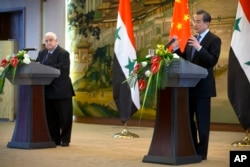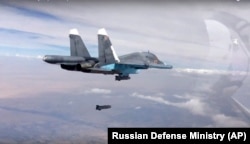Chinese President Xi Jinping's first official visit to the Middle East next week is a signal of Beijing's intention to be a major player in Mideast affairs, analysts say.
The Chinese government has not yet announced specifics of Xi’s Mideast tour. But official agencies in Iran and Egypt say he will visit the region beginning January 20. This would be the first time in 12 years a Chinese president will visit the two countries. Xi is also expected to visit Saudi Arabia.
China, has been signaling its growing interest in dealing with thorny issues in the Middle East.
Beijing issued its first ever policy paper on the Arab world on Wednesday, promising to support Arab governments in their fight against terrorism through long-term security cooperation, intelligence sharing and technical cooperation. In December it hosted Syrian Deputy Prime Minister Walid al-Moallem, and also representatives of the Syrian opposition.
Beijing recently sent Vice Foreign Minister Zhang Ming to Saudi Arabia and Iran to help lower tension caused by the execution of a controversial Shi'ite cleric and the attack on the Saudi embassy in Tehran.
The recent moves sparked speculation that China might send its troops to Syria to fight alongside Russian soldiers. Analysts are asking why China wants to step into a diplomatic mine field that poses serious risks.
“If you are able to make a difference in the Middle East, you will be regarded as a major country. China faces restrictions in the Middle East, but it is ready to play its role,” said Li Shaoxian, vice president of Institute of Contemporary International Relations, a government-run think tank.
But Li says, "Unlike Russia, China has no need or aspirations for a military role. We can accept anything that is in line with the desires of local people in another country."
China is worried that disruptive events in the Middle East may impact the thinking in its vast Muslim population. It is possible that thousands of Chinese Muslims have migrated to fight for different forces in Syria, he said.
Managing contradictions
Analysts say there are signs Chinese leaders are determined to get a taste of managing disputes in the Middle East, which it has avoided for decades. One in particular is its effort to be friendly with both Israeli and Palestinian leaders.
“China is trying to strike a delicate balance. It wants to support the Palestinian cause because this will earn it respect and sympathy in the Middle East. But it cannot turn its back on the useful technologies that Israel can supply,” Daud Abdullah, director of the London-based Middle East Monitor told VOA.
“We know, for instance, that Israel has been covertly supplying to China the arms know-how it acquired from the U.S.”
Most analysts believe China will tread carefully, because taking sides in the tumultuous Mideast can have negative repercussions in its own region of Xinjiang, which is a hotbed of Islamic terrorism. For example, it is careful not to take a stance that would displease Turkey because Uighur Muslims in Xinjiang are Turkic speaking people.
“I think China is trying to find a political role for itself in the Middle East. It is difficult for China to stay neutral, but it is going to give it a try,” Francesco Sisci, professor at the Renmin University in Beijing, said.
Economic motives
The Middle East is important because the region is one of the three routes chosen for China’s Silk Road program, which is expected to boost the Chinese economy in a big way, Sisci said.
“Beijing will try to be neutral with regard to tensions among Iran, Saudi Arabia and Syria. But they want China to take a more clear cut stance,” Hichem Karoui, political adviser at the Diplomatic Institute at Qatar, said.
Li cited three other reasons why China wants to play a major role in the Middle East. More than half of China’s energy imports come from the region. It is an important aspect of the Silk Road program, which involves building infrastructure projects across several countries. And it is essential to play an important role in the Middle East to be taken seriously as a major power, he said.






